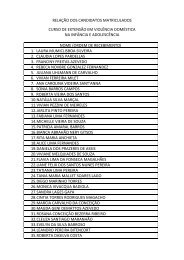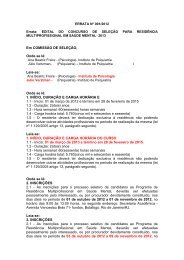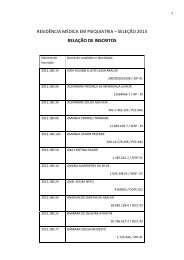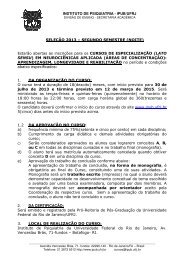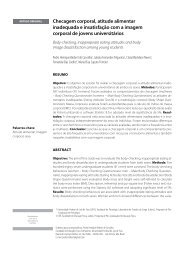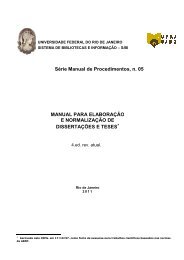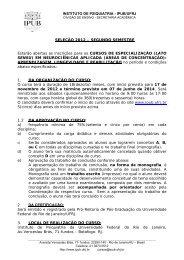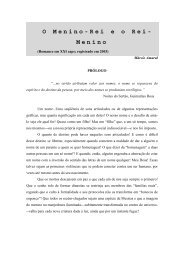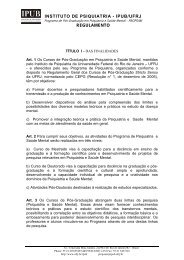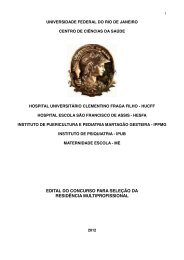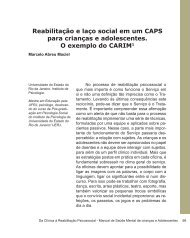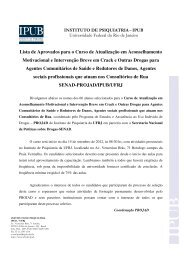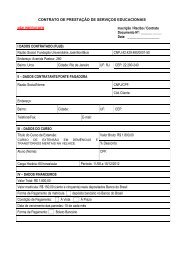Originais â Originals outubro | dezembro ⢠2011 - IPUB - UFRJ
Originais â Originals outubro | dezembro ⢠2011 - IPUB - UFRJ
Originais â Originals outubro | dezembro ⢠2011 - IPUB - UFRJ
You also want an ePaper? Increase the reach of your titles
YUMPU automatically turns print PDFs into web optimized ePapers that Google loves.
instructions for authors<br />
topics: objective(s), methods, results and conclusions. Keywords in Portuguese should<br />
follow the summary and be limited to four words reflecting the content of the article’s<br />
subject. We recommend the terms presented at the list entitled Medical Subject Headings<br />
from the Index Medicus or, for articles in Portuguese, at Descritores de Ciências da Saúde,<br />
published by BIREME.<br />
The third page must contain an abstract and keywords, in English, which must be<br />
both identical to their versions in Portuguese.<br />
From the fourth page on begin the body of text which in original articles and brief<br />
communications, must contain the following sections: Introduction, Methods, Results,<br />
Discussion and Conclusions. The authors should not mix Results and Discussion in the same<br />
session.<br />
Introduction – Must contain a concise review of any literature directly related to the<br />
theme, as well as the aim of the study.<br />
Methods – Must describe the model of study and a detailed account of methods that<br />
permit its replication by other authors.<br />
Results – Must be described logically, sequentially and concisely, with the occasional<br />
help of tables and illustrations.<br />
Discussion – The discussion must be limited to highlighting the conclusions of the<br />
study, consider any similarities or differences with the results of other authors, implications<br />
of the findings, limitations and future perspectives.<br />
Conclusions – One must specify, preferentially in a short paragraph, solely the<br />
conclusions the study data allow to support, together with their clinical significance<br />
(avoiding excessive generalizations).<br />
Tables and illustrations must be numbered in Arabic numerals, and prepared in<br />
separate paper sheets, with the respective captions. They should be in a digital format and<br />
independent file, proper for reproduction. Each table must be self-explanatory, and must<br />
not repeat the information already present in the text. Places for table’s insertion must be<br />
clearly indicated in the text. Histograms describing results from descriptive studies will not<br />
be accepted.<br />
Illustrations and photographs must be sent in high resolution files, format.tif or.jpg.<br />
Printing will be charged on the authors.<br />
Acknowledgements must be mentioned before references.<br />
References<br />
References must be presented in Vancouver stile (“Uniform Requirements for<br />
Manuscripts Submitted to Biomedical Journals: Writing and Editing for Medical Publication”<br />
[http://www.nlm.nih.gov/bsd/uniform_requirements.html]), in the same order to quoted<br />
in the text, as in the example.<br />
Article<br />
• Versiani M. A review of 19 double-blind placebo-controlled studies in social anxiety<br />
disorder (social phobia). World J Biol Psychiatry. 2000;1(1):27-33.<br />
• Appolinario JC, McElroy SL. Pharmacological approaches in the treatment of binge<br />
eating disorder. Curr Drug Targets. 2004;5(3):301-7.<br />
• Dekker J, Wijdenes W, Koning Y A, Gardien R, Hermandes-Willenborg L, Nusselder<br />
H, et al. Assertive community treatment in Amsterdam. Community Ment Health J.<br />
2002;38:425-34.<br />
Book<br />
• Goodwin FFK, Jamison KR. Manic-Depressive Illness. New York: Oxford University<br />
Press; 1990.<br />
Book chapter<br />
• Heimberg RG, Juster HR. Cognitive-behavioral treatments: literature review. In:<br />
Heimberg RG, Liebowitz MR, Hope DA, Scneier FR, editors. Social Phobia – Diagnosis<br />
Assessment and Treatment. New York: The Guilford Press, 1995.<br />
In press articles may be included in the bibliography, but they must show the periodical<br />
name, with volume and year indicated. Unpublished material may be cited in parentheses<br />
in the text, but should not be listed in the bibliography. Abstracts may be cited only when<br />
they contain substantial information that is not published elsewhere. Their nature must be<br />
cited in the bibliography by adding the term (Abstract) at the end of the reference.<br />
References to web pages must be listed as followed: Associação Brasileira de<br />
Psiquiatria – Diretrizes para a Indústria da moda. Recomendações da Comissão Técnica<br />
Brasileira de Grupos Especializados no Estudo e Tratamento de Transtornos Alimentares.<br />
http://www.abpbrasil.org.br/newsletter/comissao_ta/diretrizes_moda.pdf. Accessed on:<br />
April 12, 2007.<br />
Types of Articles<br />
1. Original articles – Manuscripts communicating results of research, clinical<br />
experiences or other original contributions. Typically, the original articles present new<br />
data derived from an investigation done with a representative number of individuals. The<br />
original articles must not exceed 4,000 words and 30 bibliographic references.<br />
2. Brief communications – Characterized by manuscripts containing small<br />
experiences or preliminary communications with original character, never longer than<br />
2,000 words and with 15 bibliographic references.<br />
3. Review articles − Systematic reviews of the literature that attempt to answer<br />
a well-defined question. They should contain a maximum of 6,000 words and 80<br />
bibliographic references. They should have front page, structured abstract, introduction,<br />
methods and discussion, conclusions and bibliographic references.<br />
4. Updating articles − Descriptive and interpretative works based on recent<br />
literature about the current status of a given subject. They should contain no more than<br />
3,000 words and 40 bibliographic references and must be briefer than review articles. They<br />
should have front page, abstract (not necessarily structured), introduction, methods and<br />
discussion, conclusions and bibliographic references.<br />
5. Case reports – Manuscripts containing interesting and original clinical cases.<br />
They should contain: front page, summaries, introduction, description of the case, its<br />
relevance and/or originality, discussion, conclusion and bibliography on the theme. They<br />
should not exceed 1,500 words and 15 references. The description of the case must be brief,<br />
with a review of the literature about clinic and therapeutic aspects, avoiding redundant<br />
or unimportant data. The discussion must have the data in comparison and contrast with<br />
similar cases present in literature.<br />
6. Letters – Communications aiming at discussing articles recently published in the<br />
journal or describing original researches or meaningful scientific discoveries. Brief letters<br />
with a maximum of 500 words and five references will be considered, as long as the<br />
sentence for publishing is explicit.<br />
7. Book reviews – Brief reviews about recently published books that may interest<br />
the psychiatric milieu.<br />
Sending of Manuscripts<br />
The originals must be sent to the editor Leonardo Fontenelle or Antônio Egídio Nardi<br />
by e-mail: editora@ipub.ufrj.br.<br />
Jornal Brasileiro de Psiquiatria<br />
Av. Venceslau Brás, 71 − Fundos<br />
22290-140 −Rio de Janeiro, RJ<br />
Tel: (55-21) 2295-2549 Fax: (55-21) 2543-3101<br />
In addition, the authors must send an authorization letter signed by all of the authors,<br />
according to the model below.<br />
Once accepted for publication, the paper becomes permanent ownership to Jornal<br />
Brasileiro de Psiquiatria and all rights are reserved in Brasil and abroad.<br />
Permission Letter<br />
“The undersigned authors transfer to the Jornal Brasileiro de Psiquiatria, with<br />
exclusivity, all the publishing copyrights, under any means, of the article ..., here the authors<br />
guarantee that the article is neither published nor being evaluated by other periodicals,<br />
moreover that the study was conducted in accordance to the principles of the Declaration of<br />
Helsinki and its amendments, including informed consent approved by a properly qualified<br />
ethics committee.” (Include complete name, address for postage, telephone, fax, e-mail<br />
and signature of all the authors).



